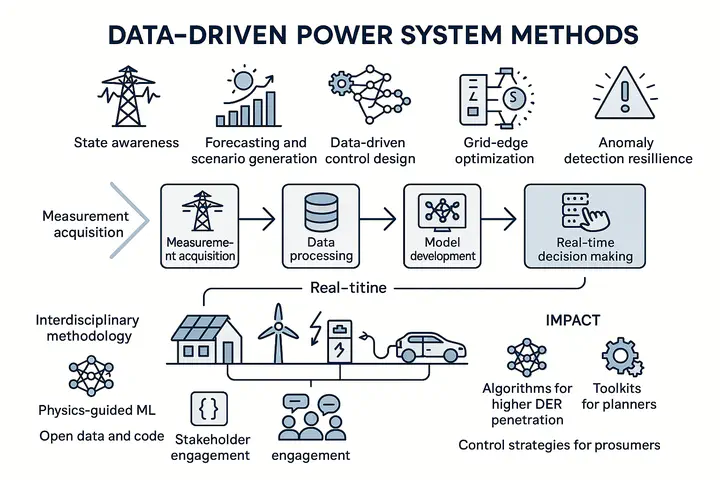Data-driven Power System Methods

The Data-Driven Power System Methods research theme explores how modern machine-learning and statistical-learning techniques can be harnessed to operate, control, and plan increasingly complex electrical grids. Our work spans the entire data pipeline—from measurement acquisition to real-time decision making—with a particular emphasis on distribution networks where high penetrations of distributed energy resources (DERs) such as photovoltaics, wind turbines, battery storage, and electric vehicles are rapidly changing power‐flow patterns.
Focus Areas
State awareness: We develop physics-informed neural networks and probabilistic estimators that infer voltages, currents, and power flows from sparse or low-quality sensor data, enabling system operators to maintain visibility without costly metering roll-outs.
Forecasting and scenario generation: Using deep learning, ensemble learning, and generative models, the group produces high-resolution forecasts of load, renewable production, and market prices to support short-term operations and long-term planning.
Data-driven control design: We design local and distributed controllers for inverter-based DERs that emulate optimal power-flow policies, provide synthetic inertia, or mitigate voltage and congestion issues—all learned directly from historical or simulated grid behaviour.
Grid-edge optimisation: Reinforcement-learning agents and convex surrogate models are used to co-optimise flexible demand, storage, and network assets, delivering services such as peak-shaving, frequency regulation, and congestion relief.
Anomaly detection and resilience: By combining graph-signal processing with unsupervised learning, we detect cyber-physical disturbances, equipment malfunctions, and extreme-weather impacts in real time, improving grid reliability.
Methodology and Collaboration
Our approach is highly interdisciplinary:
- Physics-guided ML integrates first-principles power-flow equations with data-driven models, ensuring physical plausibility and strong generalisation.
- Open data and code: The lab curates benchmark feeders, measurement datasets, and open-source toolchains to accelerate reproducibility and community adoption.
- Stakeholder engagement: Projects are conducted in partnership with DSOs, TSOs, technology vendors, and academic collaborators worldwide, translating research prototypes into field-demonstrated solutions.
Impact
The outcomes of this research theme include:
- Algorithms that allow operators to safely run feeders at higher DER penetrations without expensive network reinforcements.
- Toolkits that help planners quantify hosting capacity, evaluate climate-driven risk, and prioritise grid-modernisation investments.
- Control strategies that unlock new revenue streams for prosumers while supporting system-wide decarbonisation targets.
Ultimately, our data-driven methods pave the way toward a resilient, low-carbon electricity system that is intelligent, adaptive, and equitable.